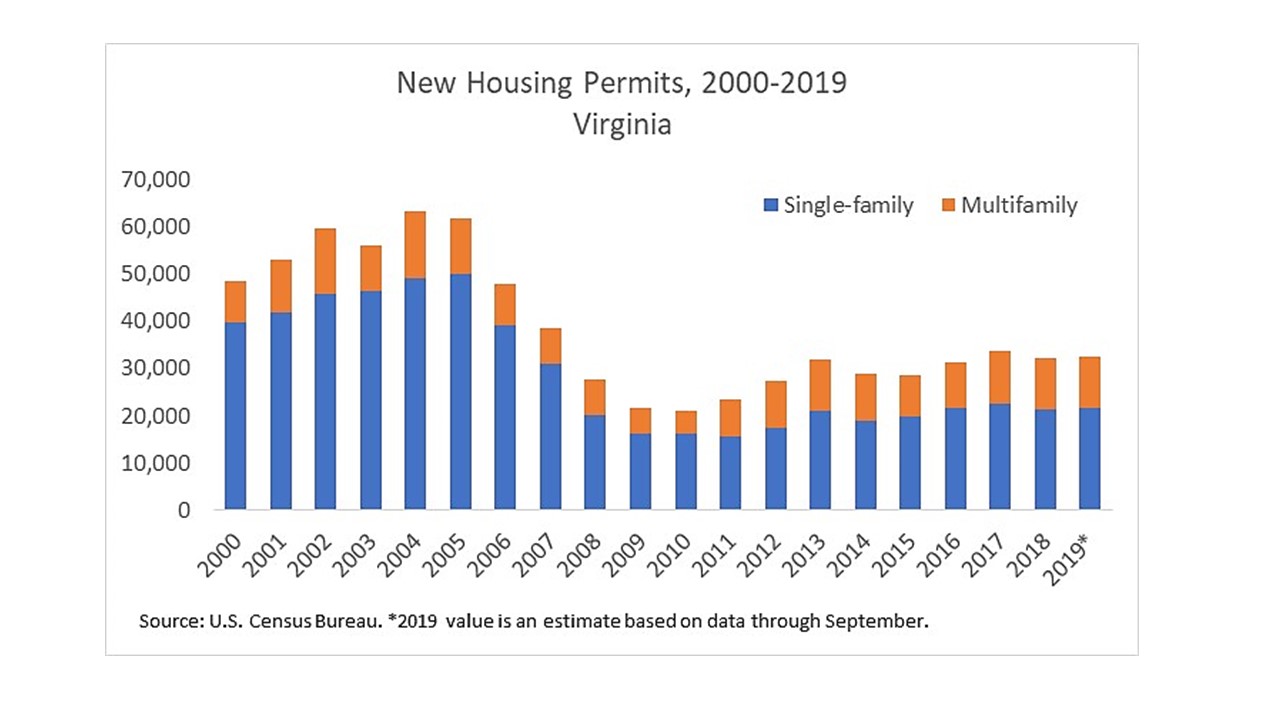Virginia’s New Home Construction Still Not Sufficient to Meet Demand
November 22, 2019
By: Chief Economist Lisa Sturtevant, PhD
Nationally, new home construction has been on the rise in recent months. There were 1.314 million new housing starts nationwide, which was the best month of new home construction in 2019. An uptick in new home construction could help ease housing affordability challenges in some parts of the country, bringing more homebuyers into the market.
In Virginia, however, even though there were increases in new construction in 2011 through 2013, the number of new homes coming online has not increased significantly in recent years. In 2019, there will be an estimated 32,553 permits issued for new home construction, including both single-family and multifamily construction, which is virtually unchanged from last year. The number of single-family homes permitted for construction has risen slightly; however, single-family homes still make up only 67% of new housing permits in Virginia in 2019, compared to 80% back in the early 2000s.

For years, new home construction in Virginia has been far below what is needed to meet demand. Virginia REALTORS® is estimating that there will be over 40,000 new households added in the Commonwealth each year for the next 10 years. However, in 2019, there were just over 32,500 new housing units authorized by building permit. As the inventory of existing homes for sales continues to plummet, the lack of new housing supply has exacerbated housing affordability challenges—particularly for first-time homebuyers—in many markets.
There are several reasons why the pace of new housing construction is still below what is needed:
- Land is expensive in many places in Virginia and/or there is lack of developable land for new housing.
- Rising material costs, including rising lumber and steel costs, have impacted the residential construction sector.
- A severe shortage in construction workers has driven up labor costs and has made it increasingly difficult for builders to find skilled workers.
- Some state and local regulations (e.g. zoning) limits the construction of new housing.
- Community opposition to new housing can stall new housing developments.
What can Virginia REALTORS® due to support much-needed new home construction? While it is beyond the reach of an individual REALTOR® or REALTOR® association to affect land, material, or labor costs, REALTORS® can have a very important impact on what gets built in their communities. Decisions about the amounts and types of housing are often made by local citizen planning and zoning boards and by local elected officials. REALTORS® can proactively advocate in front of these citizen and elected boards for new residential projects. This support is particularly important when there are vocal parties in the community ready to stand up and voice their opposition to new housing in public forums.
Without a ramp up in new home construction, there will not be sufficient housing to meet demand in Virginia. Home prices will continue to rise, first-time homebuyers and others increasingly will be left out of the market, and the opportunities for wealth building through homeownership will be lost for many.
To find out more about how you can help advocate for new housing in your community, please reach out to us here at Virginia REALTORS®.
You might also like…
Midway Through 2024, Virginia Home Sales Activity Slightly Outpacing Last Year
By Robin Spensieri - July 24, 2024
According to the June 2024 Virginia Home Sales Report released by Virginia REALTORS®, there were 10,018 homes sold across the commonwealth last month. This is 974 fewer sales… Read More
Three Multifamily Market Trends from the Second Quarter of 2024
By Sejal Naik - July 16, 2024
Each quarter, through its Multifamily Market report, the research team at Virginia REALTORS® analyzes the trends and changes in the multifamily market. Here, we share the key highlights… Read More
Takeaways From the JCHS 2024 State of the Nation’s Housing
By Dominique Fair - July 15, 2024
The Joint Center for Housing Studies from Harvard University released this year’s State of the Nation’s Housing report highlighting the impact today’s market is having on both homeowners… Read More